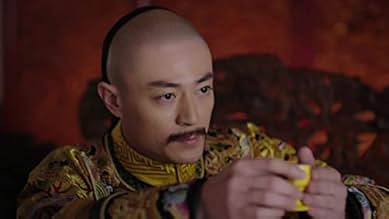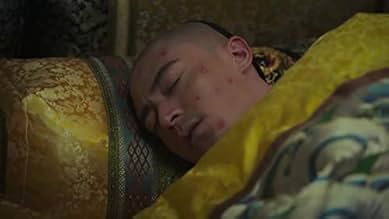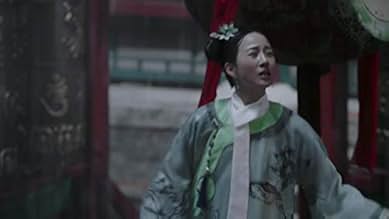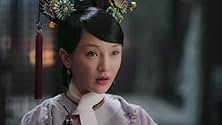Ru yi zhuan
- Série télévisée
- 2018
NOTE IMDb
7,8/10
1,1 k
MA NOTE
Ajouter une intrigue dans votre langueChronicle the marriage of the Qing China emperor Qianlong and the step empress Ru Yi, lady Ulanara.Chronicle the marriage of the Qing China emperor Qianlong and the step empress Ru Yi, lady Ulanara.Chronicle the marriage of the Qing China emperor Qianlong and the step empress Ru Yi, lady Ulanara.
- Récompenses
- 9 victoires et 6 nominations au total
Parcourir les épisodes
Avis à la une
Believe it or not, I watched three times already. It worths your time.
RUYI'S ROYAL LOVE IN THE PALACE (Ru Yi Zhuan) (2018) was a really well made series. I watched it right after I finished Story of Yanxi Palace, back to back, and at first I had very mixed feelings. But instead of letting my love for Yanxi interfere with my love for Ruyi's story, I decided they were both great and equally lovable, albeit different perspectives of the same era, during Emperor Hong Li (Qianlong Emperor) reign.
Personally, I really loved that Ruyi's story tells almost the complete opposite story than that of Yanxi. Both are such amazing series and two of my top favorite historical dramas now. Both are stories of equally strong women and how they survive in the Forbidden City. Both drama's are almost perfect in their own ways.
Some reviewers criticize UlaNara Ruyi (Xun Zhou) for being a weak portrayal of women, but if anything, it is the exact opposite. She is exceptionally brave to endure all that she did, all the twisted schemings, and hidden dangers of the palace. Never does she whimper and try to flee, or worse-join in on the twisted schemings herself-instead she becomes a woman worthy of respect and honor. For Ruyi, there was so much brutality and backstabbing around her. For her to endure with grace, humility, and even optimism all that she did-well she's all the more a strong woman for it. She fought for her love and yet, stood up to him when it mattered most. And, compared to Yanxi's heroine (who I equally loved in her own way), Ruyi offers a more realistic portrayal of historical feminism in China. Neither should be seen as lesser.
I agree, with those that criticize the Emperor Hong Li (Wallace Huo), it was difficult to watch as his character degrades throughout the length of the series. It became harder and harder to see what Ruyi saw in him, but the fact that she stood up and held her own made the ending so much sweeter and poignant. It was so moving. Honestly everything was so great, the cast, characters, visuals, story, music, etc. I loved this series.
For those that wish to compare and contrast it to Story of Yanxi Palace, as if the shows were rivals, don't let that make you miss out on a great historical drama that is Ruyi's Royal Love in the Palace. This was a unforgettable series. Brilliant.
Personally, I really loved that Ruyi's story tells almost the complete opposite story than that of Yanxi. Both are such amazing series and two of my top favorite historical dramas now. Both are stories of equally strong women and how they survive in the Forbidden City. Both drama's are almost perfect in their own ways.
Some reviewers criticize UlaNara Ruyi (Xun Zhou) for being a weak portrayal of women, but if anything, it is the exact opposite. She is exceptionally brave to endure all that she did, all the twisted schemings, and hidden dangers of the palace. Never does she whimper and try to flee, or worse-join in on the twisted schemings herself-instead she becomes a woman worthy of respect and honor. For Ruyi, there was so much brutality and backstabbing around her. For her to endure with grace, humility, and even optimism all that she did-well she's all the more a strong woman for it. She fought for her love and yet, stood up to him when it mattered most. And, compared to Yanxi's heroine (who I equally loved in her own way), Ruyi offers a more realistic portrayal of historical feminism in China. Neither should be seen as lesser.
I agree, with those that criticize the Emperor Hong Li (Wallace Huo), it was difficult to watch as his character degrades throughout the length of the series. It became harder and harder to see what Ruyi saw in him, but the fact that she stood up and held her own made the ending so much sweeter and poignant. It was so moving. Honestly everything was so great, the cast, characters, visuals, story, music, etc. I loved this series.
For those that wish to compare and contrast it to Story of Yanxi Palace, as if the shows were rivals, don't let that make you miss out on a great historical drama that is Ruyi's Royal Love in the Palace. This was a unforgettable series. Brilliant.
Although it is a sequel to the brilliant Zhen Huan Zhuan, Ruyi is different. Liu Lianzi took us on a different perspective here. I'll make it simple, Zhen huan used her head, but Ruyi used her heart. Both are completely different, but equally amazing. Not mentioning the costume, sets, bgm, and the casts, they are purely amazing. If you're not intrigued with Chinese history, at least Zhou xun's acting will hook you up to episode 87. Amazing drama! Embark yourself on an emotional rollercoaster ride, I promise it's a journey of a lifetime!
This is the best Chinese TV series I have ever watched. Having squared that away, let's get into the meat proper.
Acting: The acting performance across the board is well above average and almost every single person has pretty decent acting abilities. There were no sore thumbs sticking out. Allow me to highlight: watch for the acting performance of:
Costume Design: if you can tell how much effort is put into the costume design, something is wrong with your eyes. Colors are stunning and majestic. Very attractive, indeed.
Screenplay: some phrases are common but there are others that are more exotic and ancient; perhaps, pulled out from ancient writings. Dialogs are limited to the confines of regal conversations but still very well crafted as the twists and turns unfold. The screenplay supported the many tensions in the series very well.
Songs: Ah ... the songs ... I was totally in love with the songs and I had to buy the entire soundtrack. They are specularly composed and provides a nice platform to accompany the series; especially, the theme song for the first 2/3 of the series that used big drums to signify the weightiness and severity of the throne in the Forbidden City.
Acting: The acting performance across the board is well above average and almost every single person has pretty decent acting abilities. There were no sore thumbs sticking out. Allow me to highlight: watch for the acting performance of:
- Vivian Wu (Empress Dowager) : she was able to project a distinctly Empress Dowager presence when she opens her mouth. Her diction and intonation were simply astonishing. You can literally sense the raw power emanating from her when she spoke. Bravo!
- Xun Zhou (Ruyi herself): Xun is a versatile actress as is shown in the many films she has acted in. Her versatility is displayed here in the wide spectrum of emotions she was able to depict here. She was also able to capture my heart to side with her along the way. Highly gifted actress.
- Chun Li (Imperial Noble Consort Ling): Although her pronunciation style accentuated her femininity, the clarity of her speech is stellar. I can hear her speak again and again. She has an unusual ability to make her words fall, not just on my ears, but also onto my heart. Quite a stunning acting skill.
- Janine Chun-Ning Chang (Noble Consort Hailan): Although she played a supporting role, literally supporting Ruyi all the way to the end, her ability to depict the range of personality from the quiet type (speak when spoken to) in the beginning to violating the palatial decorum for the sake of loyalty to Ruyi, is quite a stunning unfolding of the growth in her character. I have to kowtow to such acting.
- Huan Qi (RongPei, Ruyi's personal palace assistant and confidant): That scene on the palace walk when she was noticed by Ruyi for the first time and was asked to join her palace is one of the best acted scenes in the whole series. Her acting was so well done that at the end of that scene, I wished I have such a confidant in real life.
- Jie Dong (XiaoXian Empress - the 1st Empress): Her ability act to depict the character's need to keep suppressing herself to the point of implosion was masterfully expressed throughout the length of her character in the series. One of the most memorable scenes was on her death bed in Episode 39 (I think). Her ability to express the feelings of dissatisfaction (with the Emperor), the shock (of which I'll not tell here), the confusion and the deep anguish and disappointment were top-shelf performance. It made me empathize with her. Her ability to exhibit the regal submissiveness, quiet personality and softness simply melts the heart when she spoke.
Costume Design: if you can tell how much effort is put into the costume design, something is wrong with your eyes. Colors are stunning and majestic. Very attractive, indeed.
Screenplay: some phrases are common but there are others that are more exotic and ancient; perhaps, pulled out from ancient writings. Dialogs are limited to the confines of regal conversations but still very well crafted as the twists and turns unfold. The screenplay supported the many tensions in the series very well.
Songs: Ah ... the songs ... I was totally in love with the songs and I had to buy the entire soundtrack. They are specularly composed and provides a nice platform to accompany the series; especially, the theme song for the first 2/3 of the series that used big drums to signify the weightiness and severity of the throne in the Forbidden City.
As a Chinese viewer who have watched lots of Qing Dynasty harem dramas, the main female lead are always portrayed to undergo a malicious change to evolve into a 'strong, capable and victorious' character in the end. Zhen Huan had casted away her love for Emperor Yongzheng and Yun Li, and only became the Empress Dowager for 'feeling safe'; while Wei Ying Luo can easily be summarized by a single word, which is 'revenge'. Falling in love with Fucha Fuheng or becoming the Imperial Noble Consort wasn't her initial motive either.
We have been so used to the concept in these dramas that to succeed, one must 'cast away our pure original heart, and embrace the dark side in us', while at the same time these dramas also portray that climbing up the peak of the haram is equivalent to as 'achieving success'. But is that the real case?
Ru Yi clearly knows that she CAN choose this path that'll lead her to success and prosperity but she refused to, as she still persists and held on to her true self. The beauty and essence of the drama lies exactly at here: A constant reminder that in the materialistic world where succeed is measured by the power and wealth you hold, it is still a façade and not as important as to holding on to your 'true self'.
I personally believe that a good drama doesn't necessarily mean that it should have a fast exciting pace, superb acting skills or flawless editing, but rather the moral values that it brings. This drama impacted me very, very deeply and changed my views on life. Of course, I dare not say that RRLITP brings out the best moral values, but it definitely embodies the Chinese idiom: Blooming from piles of mud, yet the lotus flower remains unstained.
Signing off here, and I hereby wish everyone a good day. Enjoy the series!
We have been so used to the concept in these dramas that to succeed, one must 'cast away our pure original heart, and embrace the dark side in us', while at the same time these dramas also portray that climbing up the peak of the haram is equivalent to as 'achieving success'. But is that the real case?
Ru Yi clearly knows that she CAN choose this path that'll lead her to success and prosperity but she refused to, as she still persists and held on to her true self. The beauty and essence of the drama lies exactly at here: A constant reminder that in the materialistic world where succeed is measured by the power and wealth you hold, it is still a façade and not as important as to holding on to your 'true self'.
I personally believe that a good drama doesn't necessarily mean that it should have a fast exciting pace, superb acting skills or flawless editing, but rather the moral values that it brings. This drama impacted me very, very deeply and changed my views on life. Of course, I dare not say that RRLITP brings out the best moral values, but it definitely embodies the Chinese idiom: Blooming from piles of mud, yet the lotus flower remains unstained.
Signing off here, and I hereby wish everyone a good day. Enjoy the series!
Le saviez-vous
- AnecdotesThis show can be treated as a sequel to "Empresses in the Palace" which revolves around the emperor's stepmother when she was a consort.
- ConnexionsFollows Zhen Huan Zhuan (2011)
Meilleurs choix
Connectez-vous pour évaluer et suivre la liste de favoris afin de recevoir des recommandations personnalisées
- How many seasons does Ruyi's Royal Love in the Palace have?Alimenté par Alexa
Détails
- Date de sortie
- Pays d’origine
- Sites officiels
- Langue
- Aussi connu sous le nom de
- Ruyi's Royal Love in the Palace
- Sociétés de production
- Voir plus de crédits d'entreprise sur IMDbPro
Contribuer à cette page
Suggérer une modification ou ajouter du contenu manquant

Lacune principale
By what name was Ru yi zhuan (2018) officially released in India in English?
Répondre

































